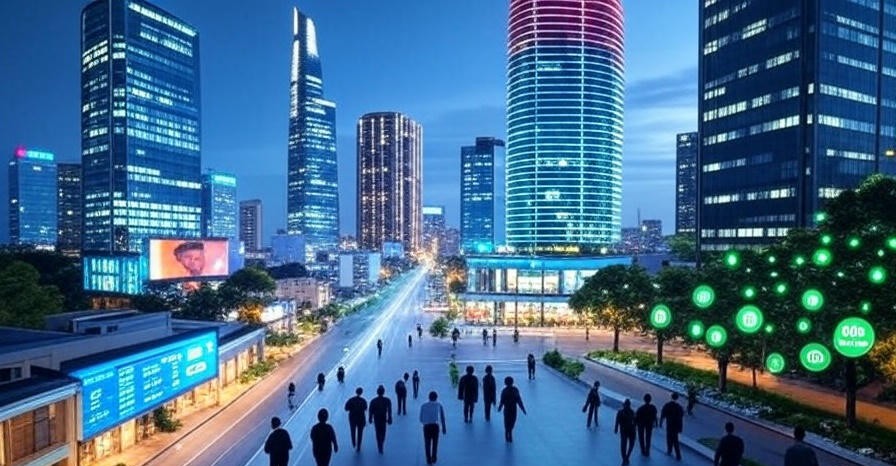Vietnam is working on an ambitious plan to become a major financial hub in Asia. The government is preparing new laws to set up international financial centers (IFCs) in Ho Chi Minh City (HCMC) and Da Nang. These cities have been chosen because they are already growing fast and have strong business environments.
The new plan will be presented to Vietnam’s Parliament on June 27, 2025. If approved it could bring big changes to the way Vietnam handles money, trade and investment.

Why Vietnam Wants to Become a Financial Hub
In recent years Vietnam has become one of the fastest growing economies in Southeast Asia. Its exports, manufacturing and digital industries are expanding quickly. However the country’s financial system is still small compared to places like Singapore or Hong Kong.
By creating an international financial center Vietnam hopes to:
- Attract more foreign investment
- Increase the use of the Vietnamese dong in global markets
- Compete with other financial centers in the region
- Support businesses with better financial services
The goal is to make HCMC and Da Nang places where global banks, investment firms and financial technology (fintech) companies can operate freely.
What’s in the Plan?
The draft law includes several key steps to make this vision a reality:
1. Liberalizing Foreign Exchange Rules
Vietnam currently controls how much money can move in and out of the country. These rules help protect the economy but make it hard for international businesses to operate. The new plan will ease these restrictions making it easier to exchange currencies and transfer money across borders.
2. Banking Reforms
Vietnam wants to open its banking sector to more foreign players. This means allowing global banks to set up offices offer new financial services and compete fairly with local banks. The goal is to improve the quality of financial services for both businesses and consumers.
3. Tax Incentives
To attract more foreign companies the plan includes tax breaks and other financial benefits. These incentives could include lower corporate tax rates tax holidays for new firms and reduced fees for financial transactions.
4. Modern Legal Framework
Vietnam is also working on modern laws to regulate international finance such as laws on digital currencies, financial contracts and cross border transactions. A clear and transparent legal system will make foreign investors feel more secure.
5. Infrastructure Investment
To support the IFCs, Vietnam will invest in better roads, airports, internet systems and office space. The plan also includes building smart cities with green technology and digital tools to support fintech and other high-tech services.
Why HCMC and Da Nang?
Ho Chi Minh City is already the financial capital of Vietnam. Many banks, investment firms and insurance companies are based there. It has strong links with international markets and a large pool of skilled workers. With better laws and services HCMC could easily grow into a regional finance center.
Da Nang, on the other hand is an emerging city with a strong digital and tourism economy. It has seen major infrastructure development and has a growing tech workforce. The government wants to make Da Nang a smart green financial city focused on innovation and fintech.
By choosing both cities Vietnam can balance growth and bring development to different regions.
Challenges Ahead
While the plan is exciting there are still challenges to overcome.
1. Regulatory Risks
Changing financial rules can be complex. It’s important to make sure new policies are clear, fair and not open to abuse. If the rules are not stable, foreign investors may still be cautious.
2. Corruption and Transparency
Vietnam has made progress in fighting corruption but it still needs to improve transparency in the financial sector. A successful financial hub needs to have strong institutions and trusted systems.
3. Global Competition
Vietnam is not the only country trying to attract international finance. Singapore, Hong Kong, Dubai and even newer hubs like Kuala Lumpur are all competing for the same investors and companies. Vietnam will need to offer something unique and competitive.
4. Skilled Workforce
Running a global financial center requires highly skilled professionals. Vietnam needs to invest in training and education to build a talent pool that can meet the demands of modern finance.
Opportunities for Vietnam
If the plan succeeds it could transform Vietnam’s economy. Here are a few of the potential benefits:
- Increased Foreign Investment: More global companies may enter the market bringing capital and expertise.
- Better Jobs: The financial sector pays well and creates opportunities in technology, law, consulting and more.
- Stronger Currency: With more money flowing in and out the Vietnamese dong could become more stable and globally accepted.
- Innovation Growth: Fintech and digital banking can grow quickly in a modern open financial system.
Conclusion
Vietnam’s push to become a global financial hub is bold and forward thinking. By focusing on HCMC and Da Nang the government is betting on cities with strong potential. The success of this plan will depend on careful lawmaking, strong leadership and open cooperation with international partners.
If done right Vietnam could soon be known not just for manufacturing and exports but also for finance and innovation.
Stay tuned as the proposal goes to Parliament on June 27. A new chapter in Vietnam’s financial journey might just be beginning.
